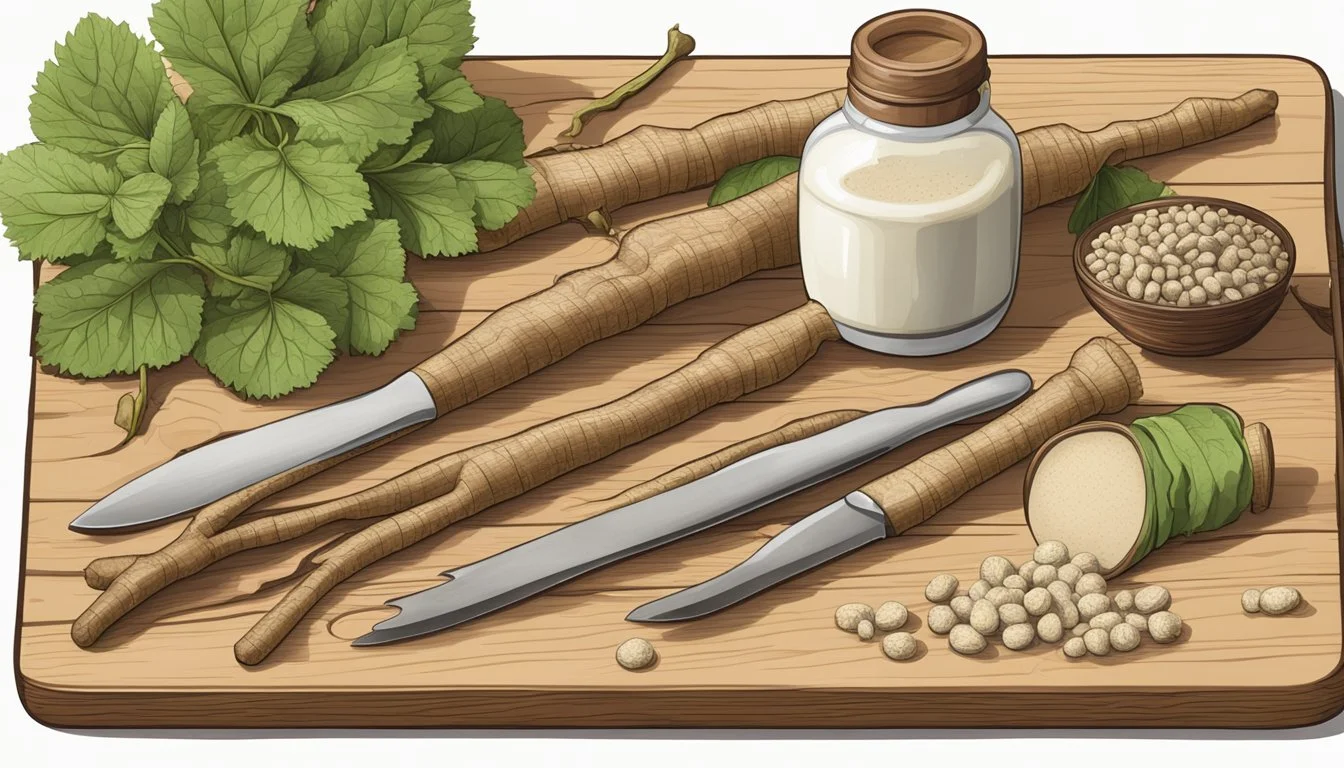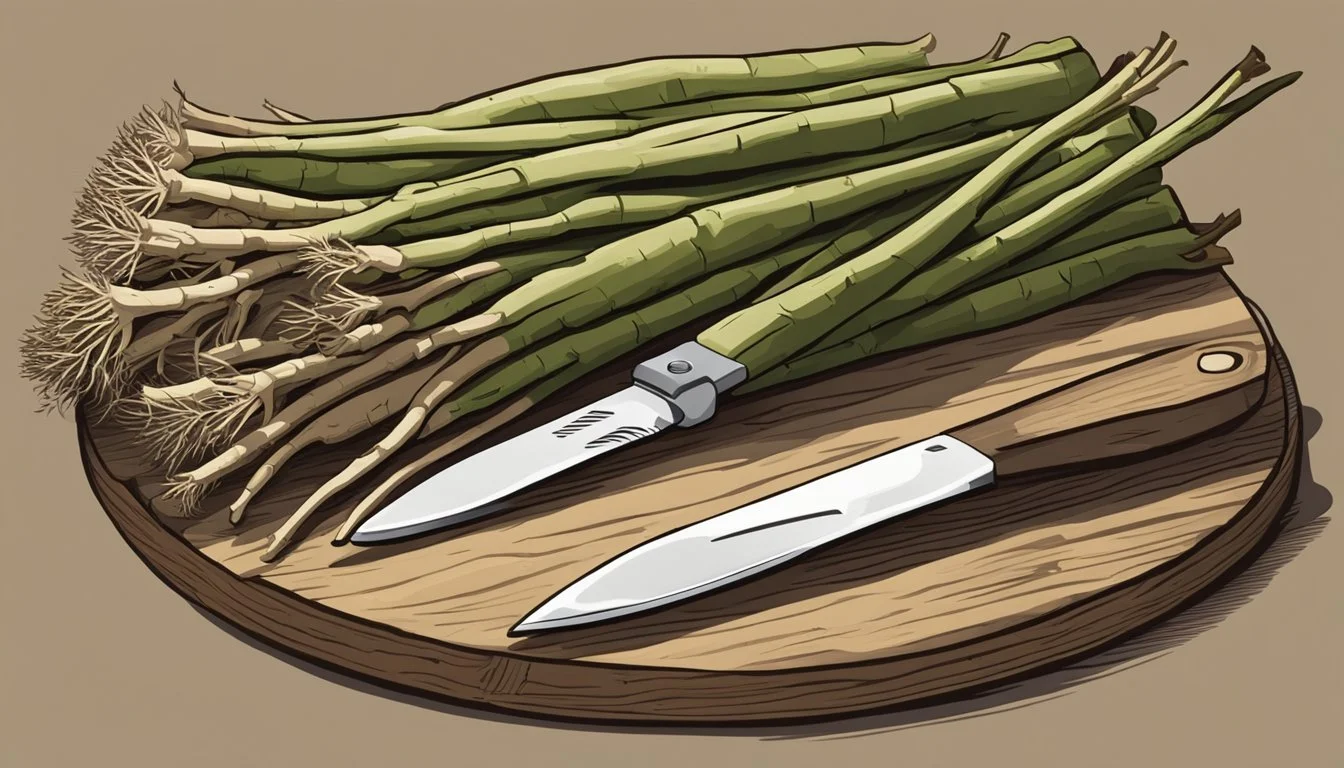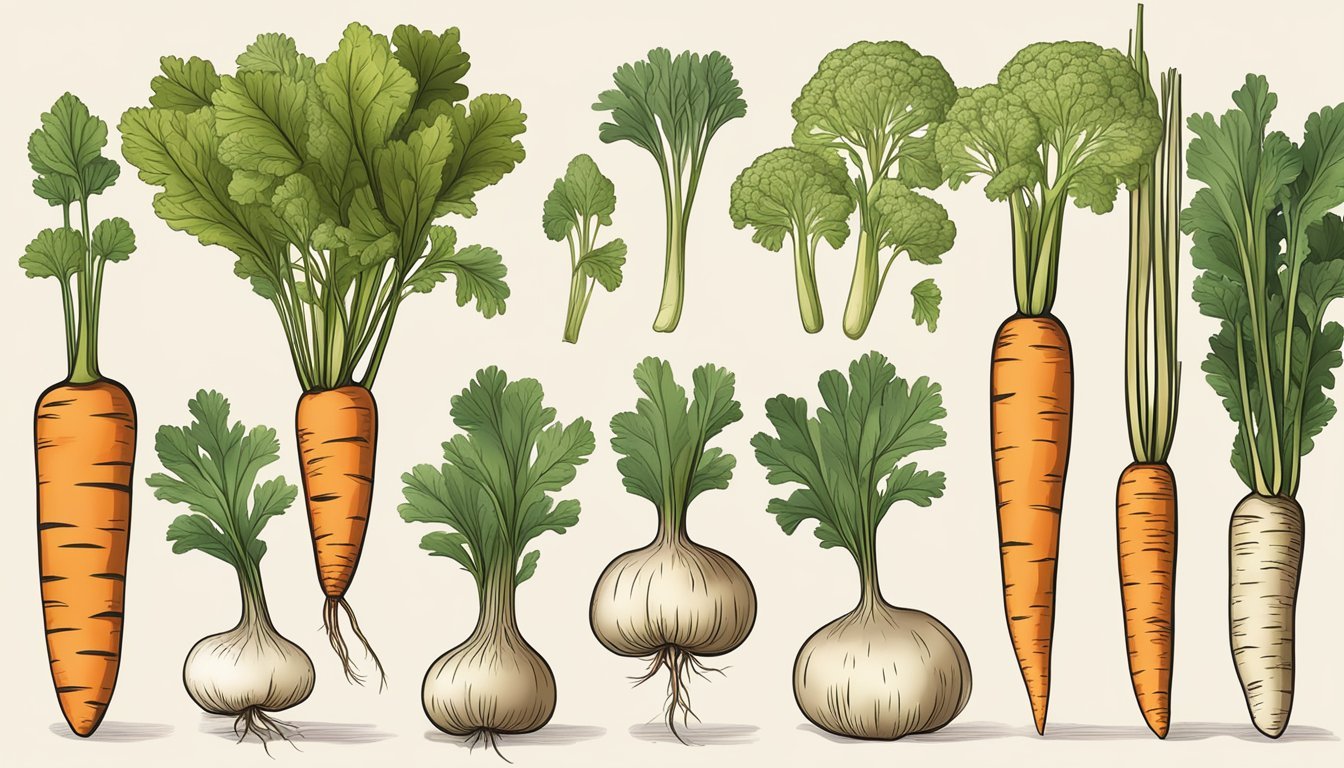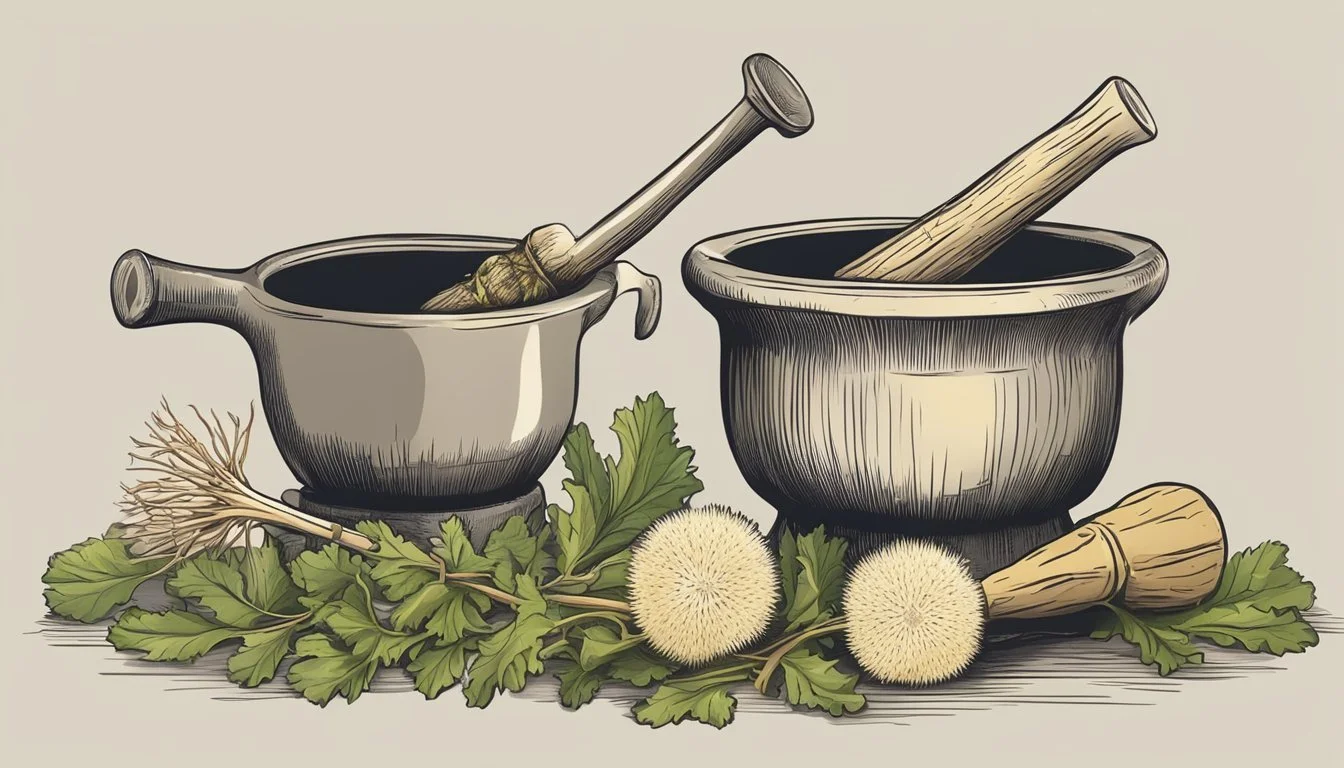Burdock Root Substitutes
Top Alternatives for Culinary Use
Whether due to availability issues or cost, there are multiple alternatives you can turn to when you need a substitute for burdock root. Chicory root stands out as an excellent substitute, offering similar health benefits and a comparable flavor profile. This long, slender root vegetable is a nutritious addition to many dishes.
For those looking for a slightly different flavor but similar texture, lotus root is a reliable choice. Its mild taste and adaptable use in various recipes make it a viable option. Celeriac and beetroot also serve as practical substitutes, each bringing its unique twist to the table while maintaining the texture and earthiness you may be seeking in a vegetable substitute.
Incorporating these substitutes into your recipes ensures that you won't miss out on the nutritional and culinary benefits of burdock root. Each alternative, such as salsify and chicory root, offers a distinct way to replicate the desired taste and texture.
Understanding Burdock Root
Burdock root, a staple in East Asian cuisine, is renowned for its distinct flavor profile and impressive health benefits. It serves not only as a versatile ingredient in various recipes but also as a superfood widely recognized for its medicinal properties.
Culinary Uses
Burdock root, also known as gobo in Japanese cooking, has a crunchy texture when raw and becomes tender when cooked. It typically has a slightly sweet and earthy flavor, enhancing dishes such as soups, stews, and stir-fries.
In Japanese cuisine, it is a key ingredient in dishes like kinpira gobo, where it is sautéed with carrots and seasoned with soy sauce, sugar, and sake. Chefs may also incorporate it into tempura, where its crunchy texture provides a delightful contrast.
Health Benefits
Burdock root is praised for its array of health benefits. It is packed with antioxidants, which help neutralize free radicals and reduce inflammation. Studies have shown that it may play a role in managing diabetes by improving blood sugar levels.
Traditionally used in medicine, burdock root is believed to detoxify the blood and promote skin health. It also contains inulin, a type of prebiotic fiber that supports gut health and digestion. As a superfood, burdock root is a nutritious addition to any diet, offering a blend of vitamins, minerals, and beneficial compounds.
Common Substitutes for Burdock Root
There are various vegetables and roots that can serve as effective substitutes for burdock root in different dishes. These alternatives are chosen based on their flavor, texture, and nutritional benefits, ensuring that your recipes maintain their desired qualities.
Vegetable Alternatives
For a different yet complementary taste, parsnips and carrots are excellent choices. Parsnips provide a similar earthy flavor, while carrots bring a slight sweetness.
Jicama and turnips are also useful options. Jicama adds a crunchy texture, perfect for salads, while turnips can be roasted or added to soups and stews for a mildly peppery taste.
Daikon radish offers a crisp texture much like burdock root, and its subtle spiciness can enhance a variety of dishes.
For Specific Dishes
When substituting for burdock root in stir-fries and soups, lotus root is highly recommended. It has a mild flavor and crunchy texture that holds up well during cooking.
Jerusalem artichokes are rich in inulin and can be used in roasted or stewed preparations, similar to burdock root.
For salads or raw preparations, salsify with its mildly artichoke-like flavor can be a delicious and creamy addition when cooked.
Roots with Similar Benefits
Chicory root and dandelion root are both notable for their nutritional profiles. Chicory root is particularly valued for its inulin content, which is beneficial for digestive health.
Dandelion root also offers similar medicinal benefits and can be used in teas or as a coffee substitute.
Yellow dock root, although less common, shares some of burdock root's detoxifying properties and can be used in herbal remedies.
These options not only provide similar textures and flavors but also ensure that the nutritional and medicinal benefits of burdock root are not lost.
Alternative Preparation Methods
Substituting burdock root in recipes can be quite easy with a few tips on different cooking techniques, seasonal considerations, and effective storage solutions.
Cooking Techniques
Salsify: Often used as a substitute, salsify can be prepared in a similar manner to burdock root. Both raw and cooked forms are popular. For a creamy texture, salsify can be boiled and mashed. For crunchier textures, it can be sliced thin and added to stir-fries.
Lotus Root: Another great alternative, lotus root is often used in stews and soups. It holds its shape well when sliced and retains a slightly crunchy texture. It can also be pickled, adding a tangy flavor to dishes.
Switch between crunchy or creamy textures based on the recipe. When stir-frying, a shorter cooking time preserves crunchiness. Boiling or simmering yields a softer, creamier texture.
Seasonal Considerations
Seasonality can affect the availability of root vegetables used as burdock substitutes. Salsify is usually available in winter, making it a great choice for colder months. Lotus root is generally available year-round but peaks in the fall and winter, ensuring consistent quality during these seasons.
Celeriac is another versatile substitute, available from late fall through winter. For those who enjoy foraging, dandelion root can be a spring alternative, offering a slightly bitter flavor. Adjusting substitutes based on seasonal availability ensures freshness and better taste.
Storage Solutions
Proper storage ensures the longevity and quality of burdock root substitutes. Salsify and celeriac should be stored in a cool, dark place or the refrigerator. They can last several weeks when kept moist in plastic bags.
Lotus root should be wrapped in a damp cloth and refrigerated. It can remain fresh for up to a week. For longer storage, consider freezing them after blanching. Pickling is also a viable option for extending shelf life while adding a unique flavor to dishes.
By following these tips, one can easily maintain a supply of high-quality root vegetables for various culinary uses.
Beverage Options
When looking to replace burdock root in beverages, consider both herbal tea alternatives and options with nutty flavors. These choices can offer similar health benefits and tastes that complement various recipes.
Herbal Tea Alternatives
For those seeking an alternative to burdock root tea, dandelion root tea presents a popular substitute. It mimics burdock root's earthy flavor and is equally nutritious. Additionally, chicory root tea offers a robust taste similar to burdock's. Both dandelion and chicory teas support digestive health and detoxification.
Lotus root tea is another option, known for its slightly sweet flavor and calming properties. Each of these teas can be steeped in boiling water for 10-15 minutes to achieve the desired strength and can be enjoyed hot or cold.
Nutty-flavored Drinks
To replace the nutty undertones of burdock root in beverages, salsify can be used. The root, when roasted, releases a mild, nutty flavor that enriches teas and drink mixes. Likewise, roasted dandelion root not only serves as a herbal tea alternative but also brings a nutty taste when prepared similarly to coffee.
Jerusalem artichoke is another notable substitute, contributing a subtly sweet and nutty essence. Blending these ingredients with honey or spices like cinnamon can enhance the overall flavor profile, creating a satisfying drink suitable for various occasions.
Beyond Culinary Uses
Burdock root is not only a versatile ingredient in the kitchen but also plays significant roles in medicine and holistic health practices. This section explores how burdock root can be substituted for medicinal purposes and integrated into holistic health regimes.
Medicinal Substitutions
Burdock root has long been used in traditional medicine, particularly in Chinese medicine, where it's prized for its detoxifying properties. Salsify, for instance, serves as an effective alternative due to its similar nutrient profile and health benefits.
Chicory root can also be used as a medicinal substitute. It contains antioxidants that help combat oxidative stress, just like burdock root. These substitutes can be consumed as supplements or brewed into tea, providing similar health benefits such as improved digestion and increased vitality.
Holistic Health Concepts
In holistic health, burdock root is often revered as a superfood for its ability to support overall wellness. Substituting it with options like dandelion root or yellow dock root can maintain these benefits. Both of these alternatives are rich in vitamins and minerals that support the body's natural functions.
Chicory root also fits into holistic health practices. It's known to help manage blood sugar levels and promote liver health, making it a valuable component in maintaining balanced health. Whether used in teas or as supplements, these substitutes align well with the principles of holistic health, promoting balance and well-being.
Shopping Tips
When seeking substitutes for burdock root, prioritizing quality and accurate labeling is essential to ensure a successful culinary experience. Consider the origin and processing of the substitute root vegetables.
Sourcing Quality Substitutes
To find high-quality burdock root substitutes, explore local farmers' markets and specialized grocery stores. Freshness is crucial; look for firm, unblemished vegetables such as salsify, chicory root, and Jerusalem artichoke. Each of these can be used to replace burdock root in various dishes.
When selecting organic options, confirm the absence of harmful pesticides. Gobo root and other rhizomes should ideally be free from synthetic chemicals, ensuring both health benefits and enhanced flavors.
Understanding Labels
Reading labels ensures you get what you need. Look for terms like "organic" and "non-GMO" ensuring produce grown without pesticides or genetic modification. Pay attention to country of origin labels, as some regions may have better agricultural standards.
For products like dried rhizomes or herbal teas, confirm if they are processed naturally without additives. This guarantees a more authentic substitute experience. Specialty items like dandelion root tea should also list all ingredients, so you know exactly what you're consuming.
By focusing on label details, you ensure the chosen burdock root substitute aligns with dietary and health preferences.
Substitute Ratios and Equivalents
When replacing burdock root in a recipe, it's important to use the right substitute ratios to maintain flavor and texture.
Celeriac
For fresh celeriac, use a 1:1 ratio to burdock root.
Consider adding extra seasonings due to its mellower flavor.
Beetroot
Use beetroot in a 1:1 ratio.
Expect a different color and slightly sweeter taste.
Chicory Root
Chicory root can be substituted 1:1 for burdock root.
This root adds a nutritious edge to dishes.
Salsify
Salsify should be used in the same quantity as burdock root, maintaining a 1:1 ratio.
Its creamy texture when cooked makes it an excellent alternative.
Lotus Root
Replace burdock root with lotus root at the same 1:1 ratio.
It provides a similar crunchy texture.
Jerusalem Artichoke
Equivalent in flavor and texture, use Jerusalem artichoke in a 1:1 ratio.
Parsnips
Parsnips can be used in equal amounts to burdock root.
Substitute them in a 1:1 ratio for a slightly sweeter taste.
Carrots
For recipes calling for burdock root, use an equal amount of carrots.
Substitute potatoes in a 1:1 ratio.
They are less sweet and provide a different texture.
Dandelion Root
Use dandelion root in the same 1:1 ratio.
Suitable especially in herbal teas.
These ratios ensure that the flavors and textures of your dishes remain balanced, despite the substitutions.
Culinary Innovations
Burdock root substitutes open up a realm of possibilities in culinary creativity. From inventive recipes to fusion cooking techniques, these alternatives offer diverse flavors and textures.
Creative Recipe Ideas
Salsify, often called "oyster plant," mimics burdock root’s earthy flavor and can be featured in unique dishes. For instance, try roasting salsify with herbs and garlic for a crunchy side dish or blend it into soups for added depth. Lotus root is ideal in stir-fries, pairing well with soy sauce and sesame oil to enhance its delicate flavor.
Celeriac, with its subtle taste, can replace burdock in mashed or pureed forms. Season it with nutmeg and thyme to elevate its mild profile. Parsnips and carrots make excellent additions to vegetable stews, enriching the dish with a sweet, earthy flavor.
Fusion Cooking Techniques
In fusion cuisine, chicory root can bring a unique bitterness when incorporated into Asian-European dishes. Use chicory in stir-fries or salads for a crunchy texture. Dandelion root tea serves as a fascinating supplement to traditional herbal brews, complementing flavors with an earthy undertone.
In modern recipes, blending beetroot with root vegetables in a hearty stew can create a visual and taste contrast, enhancing the dish’s overall appeal. Jerusalem artichokes provide a nutty sweetness in gratins or roasted alongside meat, adding depth to classic European dishes.
By experimenting with these substitutes, chefs and home cooks alike can discover new dimensions in their culinary creations, embracing both tradition and innovation. Whether anchoring a dish or serving as a complement, these alternatives bring diverse and exciting flavor profiles to the table.










